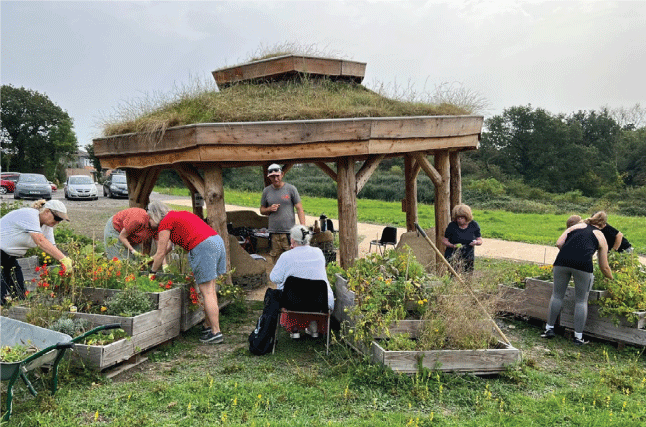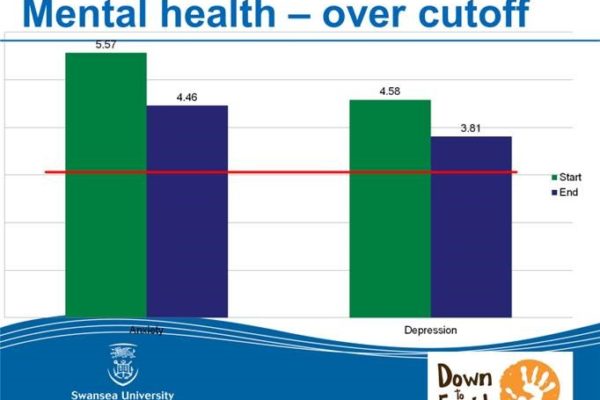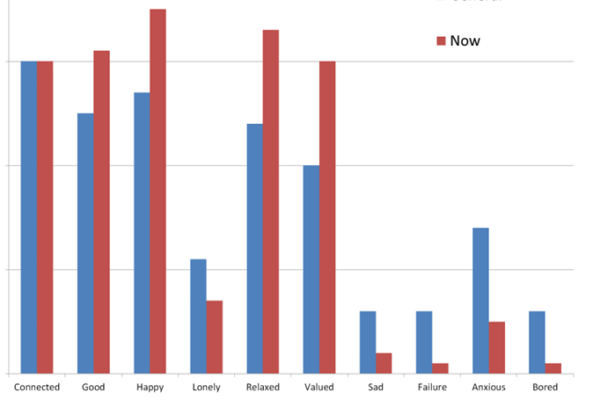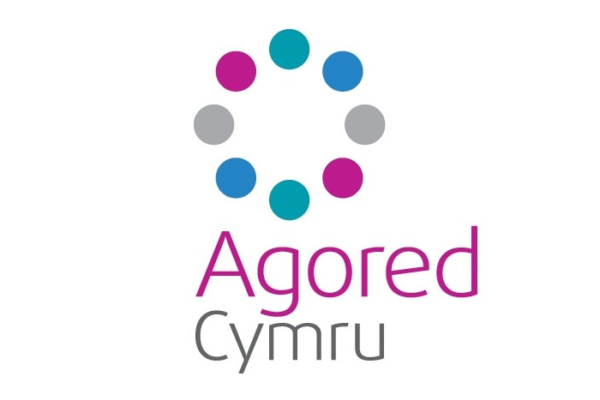Innovation in health care delivery
Clinical Research,
Learning & Well-being
Clinical Research, Learning & Well-being
In a nutshell, we merge innovation in health care delivery with innovation in education delivery – the result is a transformative approach to how we work with people (particularly the most vulnerable/disadvantaged) and delivers community-wide change.
Our clinical research has culminated in two papers being published in the “International Journal of Mental Health” including our flagship research with Swansea University into developing a new inclusive, emoji form of measuring depression and anxiety (published in May 2022). This piece of peer-reviewed research builds on previous research published two years ago which shows our approach is as effective as anti-depressants – and without the side effects. With a growing reputation and 17 year track record, Down to Earth is at the forefront of inclusive and outdoor health care delivery as well as “social prescribing”.
How we improve health and well-being
Imagine tackling depression and anxiety on an Early Intervention in Psychosis programme through young people being outdoors and building a house with natural materials on an accredited training programme. Or imagine people with traumatic brain injuries receiving neuro-rehabilitation through building homes with natural materials or sustainable woodland management. This is exactly how we work – doing meaningful, peer-based outdoor work which is carefully designed to have a rehabilitative impact.
Who we work with
We work with the health boards (NHS), statutory bodies and also charities.
We work with the following departments/units in the health boards and we are always interested in developing new partnerships.
-
Early Intervention in Psychosis
-
Traumatic and Acquired Brain Injury
-
Low secure mental health
-
Stroke
Clinical research:
Our approach is centred on an evidence based model which is peer reviewed and internationally published. With 4 separate clinical studies and a number of journal publications, our reputation is growing for clinical rigour.
An inclusive approach to clinical research
Our approach is centred on tackling inequality so it makes sense our research methods are fully inclusive. Over the last 6 years we have developed a new form of inclusive monitoring which enables people with poor literacy/numeracy levels to measure their depression and anxiety levels. Peer-reviewed and published in May 2022, this emoji method can replace the PHQ format which is commonly used internationally. We believe inclusive practice needs to be embedded in clinical research to prevent further exclusion of vulnerable groups.
To find out more about this measure and how we’ll be disseminating it, please get in touch.
info@downtoearthproject.org.uk
Accredited Learning
Down to Earth is an Approved Agored Cymru centre which means we can offer accredited outcomes to all our participants.
-
Almost all of our programmes offer full or part qualifications
-
We offer full or part qualifications as well as stand-alone units.
-
We have created workbooks which require the minimum writing as most of our evidence is based on photographs.
As a result, our accredited programmes are very accessible and with a wide range of units in our portfolio, we can normally let the group of participants choose the unit they want accreditation in.
Call 01792 232 439 now or email us to find out more about Learning and Well-being opportunities?

The Great Outdoors: An Outdoor Wellbeing Group for People Living with a Congenital Heart Condition
Rebecca Wiliams, Patient Representative, Cardiff and Vale University Health Board Dr Anna McCulloch, Consultant Clinical Psychologist, South Wales Adult Congenital Heart Disease Service, Cardiff and Vale University Health Board.
Individuals living with a Congenital Heart Condition (CHC) are at significant increased risk of developing mental health conditions such as anxiety and depression. Experiencing depression is a risk factor for illness severity. Promoting good mental health amongst this population can reduce the health inequalities experienced by this cohort and can improve their overall health and quality of life. This outdoor wellbeing group sought to improve the physical and mental wellbeing of people living with CHC’s in South Wales.
The project took place at The Health Meadow at University Hospital, Llandough. The group learned to care for the meadow, developed peer relationships and discussed helpful ways of coping with their health condition. Activities were adjusted according to need to ensure inclusivity. Group members reported improvements in wellbeing, selfconfidence, social connection and in attitudes towards fitness and exercise. There are many factors that contribute to the psychologicalsocial difficulties faced by individuals living with a CHC. Living with a CHC can disrupt normal developmental stages and can have a significant negative impact on educational attainment, the development of friendships and on feelings of self-efficacy and hopefulness (1). Such challenges can be made harder by the impact of worsening symptoms and uncertainty about health outcomes.
Psychological wellbeing, social connection and engagement in movement and exercise are predictors of health outcomes in CHC’s. For example, experiencing depression or anxiety is associated with poorer health outcomes (1). We describe an 18-month collaboration between our South Wales Adult Congenital Heart Disease (ACHD) team, Cardiff and Vale Health Charity and Down to Earth. Group members attended weekly, four-hour sessions based in The Health Meadow at University Hospital, Llandough. The sessions involved learning how to care for the meadow and learning new skills. Members had access to support from the clinical psychologist and an ACHD nurse. Group based interventions encourage peer support and can reduce feelings of isolation.
Access to nature improves wellbeing (3). Engaging in meaning activities and learning new skills encourages wellbeing and self-efficacy (4). Qualitative and quantitative feedback demonstrated improvements in: Peer relationships and feelings of social connection that were maintained outside of the group setting
- Feeling connected to nature
- Self-confidence Confidence in exercising and moving
- Relationships with the ACHD team
- Coping skills
”“I don’t know where I would be without this group”.
”I have achieved has been a source of encouragement and a can-do attitude”.
”“I took a run up a hill yesterday. That has never been me”.
The key learning from this project highlighted that:
- Peer support is important for those with CHC’s and encourages feelings of inclusion and social connection. This connection remained once the project had ended.
- Providing an outdoor space on a hospital site meant group members associated the hospital with positive experiences and reduced the anxiety experienced when attending hospital appointments.
- Having nurses attend the sessions improved patients’ confidence in participating in physical activities and improved nursing-patient relationships, making clinic appointments less stressful. Some group members went on to exercise independently.
- Having access to a clinical psychologist helped encourage shifts in thinking and behaviour.
- People living with a CHC face barriers in accessing (1) outdoor spaces, (2) opportunities to learn new skills and (3) places to exercise. This project shows the benefits of providing service specific groups to help provide patients with these opportunities.
References
References
(1) Livecchi, T. & Morton, L. (2023). Healing Hearts and Minds. A Holistic Approach to Coping Well with Congenital Heart.
(2) Kovacs, A.H., Brouilette, J., Ibeziako, P., Jackson, J.L., Kasparian, N.A., Livecchi, T., Sillman, C., & Kochilas, L.K. (2022). Psychological Outcomes and Interventions for Individuals with Congenital Heart Disease: A scientific statement from the American Heart Association. Circulation: Cardiovascular Quality and Outcomes, 15, 8.
(3) Capaldi, C.A., Dopko, R. L. , Zelenski, J.M. (2014). The relationship between nature connectedness and happiness: a meta-analysis. Front Psychol, 5, 976
Davies, J., McKenna, M., Bayley, J., Denner, K., & Young, H. (2020). Using engagement in sustainable construction to improve mental health and social connection in disadvantaged and hard to reach groups: a new green care approach. Journal of Mental Health, 29, 3, 350-357.



